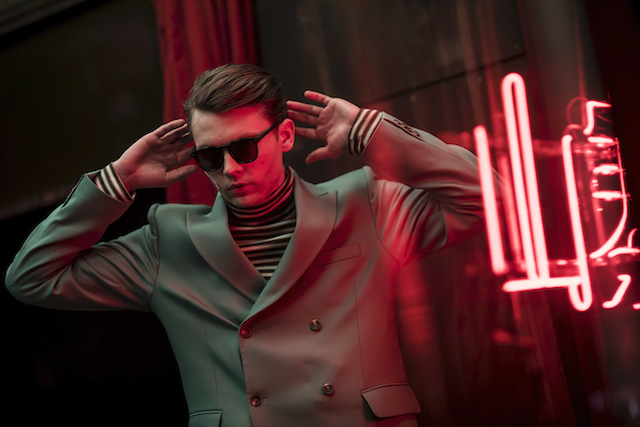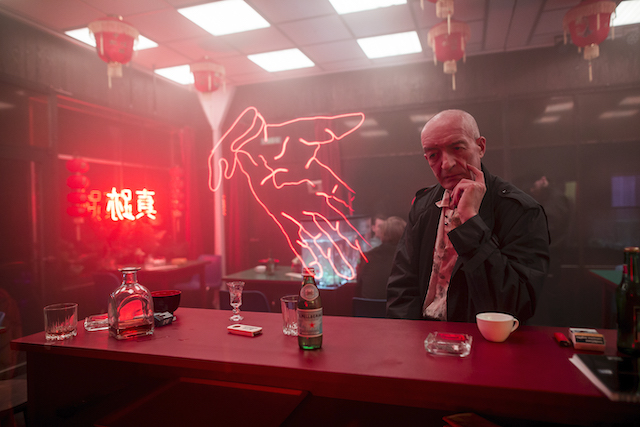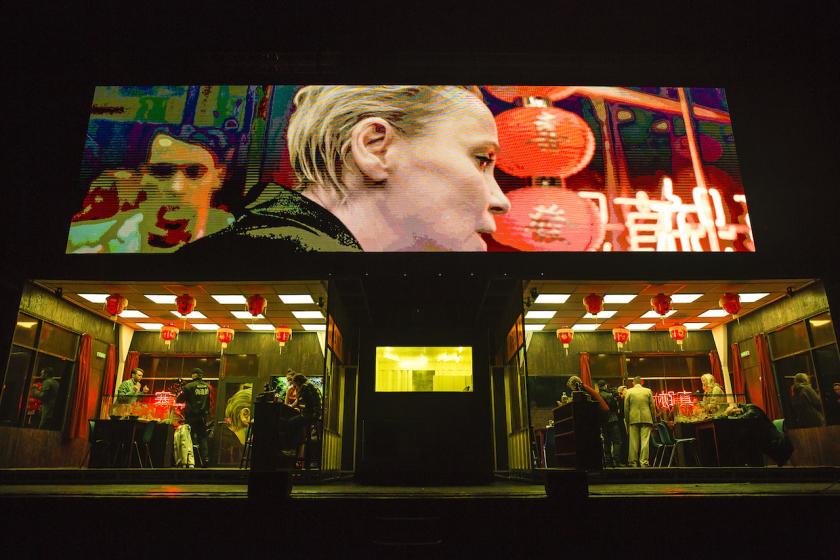It’s truly thrilling to see the Barbican embracing big concept long-form theatre again, seeking out productions that are as conceptually challenging as they are visually exhilarating. Last week, audiences were asked to understand the forces of globalisation that shaped a royal wedding dress in the Théâtre National de Strasbourg’s multimedia tour de force, Lacrima.
This week the pioneering Polish director Łukasz Twarkoswki brings his much feted Rohtko (the misspelling is deliberate), to investigate a real-life forgery scandal in which New York gallery, Knoedler & Co, sold almost 40 faked works of abstract expressionism including an $8.3m Rothko.
The scandal – which forced the gallery to close, raising numerous questions about whether director Ann Freedman was herself deceived or complicit – has already been the subject of a 2020 Netflix documentary Made You Look: A True Story About Fake Art. Now, in a vast production with Latvia’s Dailes Theatre, Twarkowski – whose multi-media, dystopian The Employees sent electric waves of excitement through the Southbank Centre earlier this year – uses the story to conduct a more philosophical investigation of the relationship between art and reality. Specifically, he is inspired by the South Korean philosopher Byung-Chul Han, whose book Shanzai: Deconstruction in Chinese subtly challenges the Western idea that fakes are necessarily worse than the originals that inspired them.
 This production has played to enough ecstatic reviews to ensure that it continues to be a must-see on the international circuit. However, I would say straight away that while there are enough ideas here to add up to a brilliant piece of theatre, Rohtko could lose one and a half hours without suffering in impact. It’s part of its wry postmodern humour that almost the entire discussion plays out in Mr Chow, the Chinese restaurant in New York where luminaries like Rothko himself, Andy Warhol and Jean Basquiat used to gather. (Such was Mr Chow’s success that he opened several more restaurants internationally, one of which still exists in Knightsbridge). Here we see narcissistic luminaries of the art world, actors playing actors who want to act out Rothko’s life story, and Rothko himself wrestling with questions of value, authenticity and fulfilment.
This production has played to enough ecstatic reviews to ensure that it continues to be a must-see on the international circuit. However, I would say straight away that while there are enough ideas here to add up to a brilliant piece of theatre, Rohtko could lose one and a half hours without suffering in impact. It’s part of its wry postmodern humour that almost the entire discussion plays out in Mr Chow, the Chinese restaurant in New York where luminaries like Rothko himself, Andy Warhol and Jean Basquiat used to gather. (Such was Mr Chow’s success that he opened several more restaurants internationally, one of which still exists in Knightsbridge). Here we see narcissistic luminaries of the art world, actors playing actors who want to act out Rothko’s life story, and Rothko himself wrestling with questions of value, authenticity and fulfilment.
Fabien Lédé’s monumental, witty set design is the star here, with shifting modules that go between the kitsch interiors of Mr Chow’s original restaurant, a modern gallery, and Rothko’s bedroom. (It tells you something about the level of detail that in the restaurant itself there are even real and fake fish tanks). To emphasise that we’re never sure that what we see is reality, the majority of the action is relayed to the audience through Jakub Lech’s video design on a screen above the set. It’s a multimedia combination beloved of postmodern auteurs; here we’re often shown the discrepancy between what we’re seeing on film and what’s actually happening between the actors on stage.  It would be difficult not to be sensually dazzled, whether by Eugenijus Sabaliauskas' lighting design, which paints a Rothko-like palette across the stage in greens and reds, or Lubomir Grzelak’s techno-dominated music design. This is genuinely thrilling, so it feels mean to say that there are acres of Anka Herbut's dialogue which are just excruciating, “Has anyone calculated how many calories can be burnt by thinking about art?” asks Mārtinš Upeniek’s deliberately shallow museum director, Jack (pictured top right). At another table at the restaurant, Kaspars Dumburs’ Orion protests of certain art audiences that, “they love materialism, I love matter”. In contrast to the techno beats that have come earlier, we're listening to the synthetic backdrop muzak beloved of Sixties and Seventies comedies – at certain points it's surprising not to see Inspector Clouseau inching round the corner.
It would be difficult not to be sensually dazzled, whether by Eugenijus Sabaliauskas' lighting design, which paints a Rothko-like palette across the stage in greens and reds, or Lubomir Grzelak’s techno-dominated music design. This is genuinely thrilling, so it feels mean to say that there are acres of Anka Herbut's dialogue which are just excruciating, “Has anyone calculated how many calories can be burnt by thinking about art?” asks Mārtinš Upeniek’s deliberately shallow museum director, Jack (pictured top right). At another table at the restaurant, Kaspars Dumburs’ Orion protests of certain art audiences that, “they love materialism, I love matter”. In contrast to the techno beats that have come earlier, we're listening to the synthetic backdrop muzak beloved of Sixties and Seventies comedies – at certain points it's surprising not to see Inspector Clouseau inching round the corner.
Yes, this is meant to be a parody – a satire on the vapidity of certain aspects of the contemporary art world. At one point, one actor tells another to "stop talking like you're in a Tarantino movie". But this doesn't feel even like Tarantino dialogue – it's more like a script dreamt up by first-year philosophy students who’ve smoked too much weed. There are more compelling moments. The play, for instance, acquires more bite when it digs into the question of NFTs, or Non Fungible Tokens, digital certificates of ownership recorded on blockchain that are used to redeem digital works of art. This could bring a bracingly contemporary spin to the discussion, but all too soon we’re watching a self-consciously embarrassing date between Jack and a waitress at the Chinese restaurant who wants to become an artist.
The production holds together because there are too many good, intriguingly original aspects to dismiss it. The connection, for instance, that forms between Andrzej Jabuczyk’s wonderful morosely expressive actor (pictured above), who wants to play Rothko in a film, and Ilze Kuzuke-Skrastina, the actress who wants to play his wife Mell. Or indeed the devastating bedroom scene where Juris Bartkevics’ actual Rothko laments his failing body, shortly before he leaves Mell in the months before he commits suicide.
Yet I left the Barbican feeling torn. On the basis of this production, I would happily watch anything by Twarkowski, and I think that theatre as a whole is infinitely better for having people like him in it. But this piece itself is considerably less than the sum of its philosophically-inflected parts. While there’s no shortage of food for thought, the ultimate impact is of being led into a conceptual labyrinth in which, possibly appropriately, there is no Minotaur at its heart.















Add comment